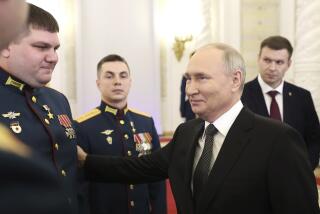A Test for the New Russia
- Share via
Some Kremlin aides continue to insist that Boris Yeltsin is strong enough to put in several hours a day at his official duties, but his own press aide says the 65-year-old president’s infirmities now permit him to work no more than 30 minutes a day. The numbers argument is all but irrelevant, however. What matters, what the world now knows, is that Yeltsin is an extremely sick man, suffering not only from advanced heart disease but, as one of his physicians confirms, from liver and kidney ailments that complicate the risks of heart surgery. Yeltsin’s chances of serving out his second term might be problematic even if he were assured of the best medical treatment. Russia, health care experts agree, doesn’t come close to being able to offer such treatment.
Nevertheless, however greatly Russia has shrunk in global power and influence since the collapse of the Soviet Union, it does remain a major, nuclear-armed power, and its president still stands in the front ranks of international leaders. Yeltsin was reelected in June after great efforts were made to disguise the true state of his declining health. Now Russian voters may soon be asked again to choose a president. The outcome of any such election, it hardly needs emphasizing, is of global significance.
If Yeltsin dies, resigns or experiences what Article 92 of the Russian constitution describes as a “long-lasting inability to exercise his duties due to his state of health”--how and by whom that inability would be decided is not stated--a new election would have to take place within three months. In the interim the prime minister, Viktor Chernomyrdin, would assume the president’s duties. The succession, though, remains wide open. Chernomyrdin wants the job. So does Alexander Lebed, Yeltsin’s security chief, top-gun corruption fighter and, maybe, the man who brought the war in Chechnya to an end. Yuri Luzhkov, the popular mayor of Moscow, might run. So, almost certainly, would Communist leader Gennady Zyuganov.
Russians have good reasons to grow nervous whenever a power vacuum looms; succession fights in their history have often been terrible things to behold. The difference this time is that the post-Yeltsin succession almost surely will be determined by democratic means, with the results, as in this past summer’s election, being accepted quietly if not necessarily gracefully by the losers. That at least is the expectation to cling to as Yeltsin himself appears to be nearing the point where he too will pass into history.
More to Read
Sign up for Essential California
The most important California stories and recommendations in your inbox every morning.
You may occasionally receive promotional content from the Los Angeles Times.













